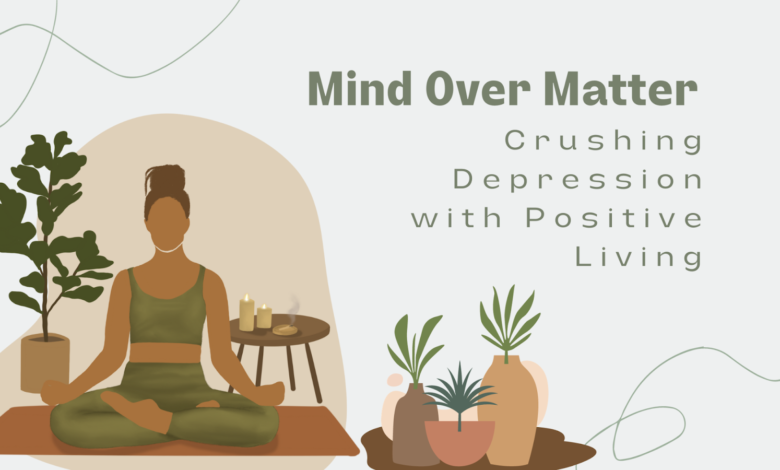Mind Over Matter: Crushing Depression with Positive Living

Depression causes deep despair and hopelessness. It drains a life of joy, purpose, and motivation. At its worst, depression leaves you feeling trapped in endless darkness.
But there are paths back into the light. Adopting a positive mindset and lifestyle provides effective weapons for combatting depression’s stranglehold. Simple habits based on human psychology can
- Rewire thought patterns
- Behaviors
- Brain activity to defeat depression’s power.
With determination and support, you can break depression’s grip. Use the following positive living strategies as tools to reclaim your mental well-being and live life again.
Understanding Depression’s Danger
Depression is a formidable foe requiring serious management. Left unchecked, it takes an immense toll:
- Joylessness and sadness
- Fatigue and low energy
- Changes in appetite and sleep
- Lack of motivation
- Suicidal thoughts
People battling depression often feel powerless and resigned to suffering. But this mindset only strengthens depression’s foothold.
Asking for help, making lifestyle changes, and trying therapies like those offered at the ketamine clinic in Beverly, Massachusetts provide ways to take back control. With work, depression’s dark veil can lift.
Adopting a Positive Mindset
Psychology studies show outlook impacts mood. Adopting positive thought habits helps loosen depression’s grip. Try incorporating:
Gratitude
Train your brain to focus on blessings, not burdens. Make daily gratitude lists of things you appreciate – friends, nature, health, etc. This builds appreciation for the meaningful.
Optimism
Counter negative thoughts with rational optimism. Believe you can get better with time and help. Look for silver linings in struggles. Possibilities exist even in darkness.
Self-Compassion
Be kind to yourself. Don’t dwell on failures. Talk to yourself as you would a friend, with encouragement and understanding.
Hope
Have faith your situation can improve, even if slow. Let the possibility of change motivate you. Nothing is permanent if you keep trying.
Mindfulness
Stay present. Don’t obsess over the past or unchangeable parts of your situation. Focus on the current step toward getting better.
Affirmations
Use positive phrases to reinforce confidence and self-worth. “I am strong enough to overcome this.” “My life has a purpose.” Repeat often.
As you strengthen positive thinking habits, negative mindsets start losing traction. Maintain dedication to the process.
Incorporating Healthy Routines
Lifestyle choices impact mental health. Physical habits that reduce inflammation and stimulate “feel-good” brain chemicals. That makes it harder for depression to maintain its stranglehold.
Exercise
Aim for at least 30 minutes of activity like walking or gentle yoga daily. Exercise releases endorphins and circadian-regulating chemicals critical for mood.
Nutritious Eating
Adopt a Mediterranean-style diet high in fruits, vegetables, lean proteins, and anti-inflammatory omega-3s. Deficiencies in vitamin D, zinc, and magnesium are linked to depression.
Stress Management
Try relaxation techniques like breathing exercises, massage, nature immersion, or meditation to calm the mind. Lowering stress hormone levels helps boost mood over time.
Restorative Sleep
Aim for 7-9 hours nightly. Good sleep regulates critical cognitive and emotional regions of the brain. Steady routines make rest more consistent.
Social Connection
Bond with understanding friends who uplift you and listen. Isolation worsens depression. Shared connection is powerful medicine.
Maintaining Medication and Therapy
For moderate to severe depression, medication and psychotherapy provide key foundations for recovery. Don’t abandon them when starting positive lifestyle work.
Medication
Continue taking antidepressants or other prescribed medications that help manage symptoms. Never stop without medical guidance.
Talk Therapy
Keep attending counseling and being open about your struggles. Therapists provide coping mechanisms and track your mental state.
Ketamine Therapy
For treatment-resistant cases, intravenous ketamine therapy induces neuroplasticity and relieves depression when other treatments haven’t worked.
Psychiatric Support
Stay under the care of a psychiatrist overseeing your treatment plan. They’ll adjust approaches if needed on your journey to stability.
Medication and therapy aid remission while positive lifestyle changes help maintain it long-term. Use all resources available.
Why Positive Psychology Matters
The proven power of mindset shift explains why positive psychology helps defeat depression:
Improves Psychological Flexibility
Positive thinking habits make you more mentally agile. You become less mired in negative thought patterns that fixate on sadness, failure, and hardship.
Boosts Motivation
A positive outlook fuels the determination to keep trying therapies and lifestyle changes. The belief you can get better makes the effort feel worthwhile.
Strengthens Resilience
Positive mindsets build coping skills to handle setbacks with optimism and avoid discouragement. You bounce back from down moments faster.
Creates Upward Spiral
Small victories achieved through positive living beget bigger ones. This momentum builds into remission.
Rewires Neural Pathways
Sustained positive thought alters brain connectivity via neuroplasticity. Depression loses its hardwired foothold.
Don’t underestimate your mind’s power. Wield it to write a new story without depression holding the pen.
Small Steps Make Big Progress
The path to defeating depression involves many small steps forward, not overnight change. Have patience and stay determined.
Start with the simplest positive practices like listing 3 daily appreciations or taking a short walk. Build upward from there. Small gains accumulate into transformation.
On difficult days, focus on getting through one hour at a time. Seek support from loved ones and know setbacks are only temporary.
Stay fixed on the light ahead, even if faint. Consistency and dedication brighten its glow with time.
FAQs
Can positive psychology alone cure depression?
Positive psychology plays a crucial role in managing and overcoming depression. But it’s often most effective when combined with other therapies and medications for moderate to severe cases. It helps reshape thought patterns and outlook, making it easier to engage in treatments and maintain mental well-being.
How long does it take for positive lifestyle changes to impact depression?
The timeline for seeing the effects of positive lifestyle changes on depression can vary from person to person. Some individuals may experience improvements in mood and outlook within weeks. While others may take several months. Consistency and patience are key, as these changes often accumulate.
Is it possible to overcome severe depression with positive psychology alone?
Overcoming severe depression requires an approach, including medication, psychotherapy, and positive lifestyle changes. While positive psychology can be a valuable component of treatment, it’s usually not good on its own to address severe depression. Consult with mental health professionals for a tailored treatment plan.
Life Awaits Beyond the Darkness
Depression tries to convince you that happiness isn’t possible. Don’t believe it’s lies. Life holds so much joy, fulfillment, and purpose once depression’s fog lifts.
Keep marching forward armed with positive psychology tools. Winning small battles leads to greater victory in the war. Light always drives out darkness if you keep walking toward it.
The journey requires courage, compassion, and hope even on the toughest days. You are strong enough. Know you don’t walk alone. Keep going – your new life awaits.



